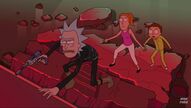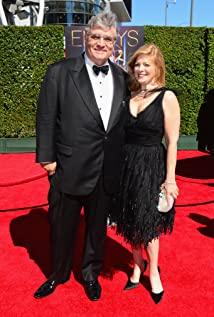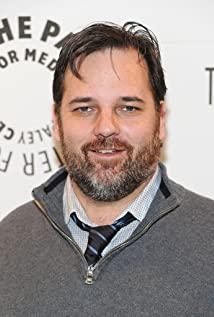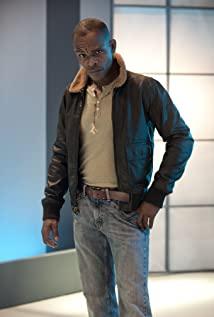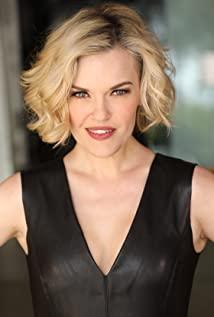One of the most important character traits in Rick, as conveyed by the president in this episode, is unyielding. Thanks to his genius, wisdom, and near-divine creativity, he was able to break free from the rules of the real world and become an absolutely free indeterminate factor in the universe. No authority can bind him unless he turns himself in (the second season finale), or volunteers to form an authority of his own (Ruicheng). And Rick of C137, the Rick who calls himself the most Rick, is the most irresponsible person among them - even Ruicheng can't imprison him. He completely spurned the concept of "authority". In the first episode of the third season, his first reaction to witnessing the 9/11 terrorist attacks was "No, so they can blatantly deprive us of our freedom." In Rick's value orientation, "authority" is definitely listed at the bottom. He worked with the US government to save the planet in get schwifty, but it was more for fun. Including what this episode said: "It's too much trouble to live in another dimension."
Therefore, it is certain that Rick is completely disdainful of authority. He hates authority and places himself above and beyond all authority. And what does he think is most valuable? What is the only thing this crazy old man shows that he truly cares about and cherishes in three seasons and thirty episodes? Apparently his grandson Morty. His most cherished grandson asked (more than once) to take a selfie with his most despised symbol of authority, the President of the United States, only to be easily rejected. This is unacceptable to Rick's logic.
So Rick and the president got into a big fight over the most trivial thing in the world — taking a selfie with a fourteen-year-old. From Rick's point of view, he did it because of Morty, but then it had nothing to do with Morty. His desperate effort was to prove an idea, a principle, to prove his logic with violence - that is, "his grandson>>>>America/President/Government/All Authority". In other words, by taking a selfie with one person and fighting the White House for 300 rounds, he placed his own values above all universal values, and wanted everyone to see and convince everyone.
It is somewhat similar to the Chinese's own "Havoc in Heaven".
In this way, the theme of this episode is very clear, and a meeting is completed at the end and in the subplot - Rick exhausted his efforts, grabbed countless heads, and finally forced the president to accept the request for a selfie, and then But it was found to be empty. The grandson had left him long ago. On the other hand, Jerry didn't make any effort, didn't use any tricks, just relying on his stupid instinct to prove his worth - his value in Beth's mind - not by force, but by showing his true feelings to win back a family people. I don't want to dwell too much on the persuasiveness of this plot here. After all, based on the abnormal situation of "Beth may be a clone", it is not impossible to trigger some plots that are not convincing, and it seems that the author is too lazy to write... All in all, the plots of the main line (Rick) and the sub-line (Jerry) interact with each other. It is a mirror image, and the inside and outside are consistent, and finally at the moment when Rick threw down the gun and announced his surrender, it appeared like black and white words: the organization is exhausted, and in the end it is still a wedding dress for others.
Rick triumphed over the authority he despised, stomped it under his feet, and suddenly lost what he held dear. And Jerry, who is trampled on by almost everything, has no trouble getting what Rick holds most dearly. Is this the play's satire on Rick, a counterattack to the anti-anti-intellectualism and anti-anti-scientific spirit represented by Rick? I personally don't think that's the case, or that it's not as simple as either praise or jeopardy.
The plot of the first three seasons of RaM, rather than using Rick as the representative of the smart man and Jerry as the representative of the fool, is better to put the two on the poles of the axis of "seeking knowledge" and "ignorance and contentment with ignorance". Every time Rick wins a certain chapter and Jerry becomes the laughing stock of a certain chapter, the work is not promoting the elitist idea of pure IQ crushing, but calling on people to seek knowledge-abandoning a kind of security. Due to the current situation, limited by experience and prejudice, the way of thinking is like what others say, to actively seek knowledge like a child. Respecting truth rather than appearances, breaking out of comfortably familiar surroundings, entering dangerous virgin lands, and exploring uncharted territories—that's what Rick and Morty's adventure is all about.
But life isn't all adventure. Just like knowledge—even a very important, precious trait in a person—isn't the whole thing. On any duality axis, people are running back and forth at both ends. Just like the Taoist theory of the so-called harmony of yin and yang. Rick and Jerry are completely opposite extremes in many ways: Rick is willing to take risks, Jerry is content with the status quo; Rick is rebellious and Jerry is docile; Rick's first reaction to being suppressed is to attack and resist, and Jerry's first reaction is to surrender and save his life... …In the first episode of season three, these qualities of Rick earned him his family back. (No matter how sloppy, the reason why Rick won the hearts of his family at the beginning of the season is still the previous self-sacrifice and genius self-saving actions. Although these two processes are diametrically opposed, they are both heroic in nature. It can be said that, Rick's heroism wins the first confrontation with Jerry's shrewd tortoise-like philosophy.) But in the final episode, it's the same qualities that cost him all.
I think this is the meaning conveyed in this episode: Thirty years of Hedong and thirty years of Hexi, everything is constantly transforming and changing. Nothing can make you win forever. Wisdom will be hurt, strong will be humiliated. The end of the second season has us seeing a vigorous tragic suspense. At the end of the third season, the tragedy is silent. In the end, Rick had to put on a silly little cap like a certain clown, pull a lie he didn't scoff at, and seek reconciliation with an authority he despised the most.
"The tragedy of life is not that beautiful things die prematurely, but that they grow old and become inferior." - The difference is that in this story, our protagonist himself chose "lowness". He chose to make a compromise that was base in his eyes, in order to stay with his family.
Some people see Rick as a nihilist who doesn't care about everything and insists that nothing is special and therefore nothing makes sense, this episode is a major step forward for Rick's character - recognizing that some things are Meaningful and working towards it - that might be an interpretation, but I think it's too superficial. Is Rick a nihilist? maybe. But does he really think that everything is meaningless and unimportant? Isn't the answer obvious? Since the first season, the plot has always reflected the inconsistency of his words and deeds: he killed the prisoner who molested his grandson, sacrificed his life to save his grandson, and also cared about the safety of his grandchildren when he was enjoying the spring night with his old lover, not to mention being killed by the old lover. The lover refused to commit suicide. He went to prison for his family and escaped to be reunited with his family. Even if he turned himself into a cucumber in order to avoid family psychological counseling, he still participated in the psychological counseling as a cucumber afterwards.
Whether Rick cared about his family was never an issue. The question is when will he face this and not feel sad or ashamed about it. If this episode was a qualitative leap in character building, it was that Rick was finally forced to confront the fact that "he cares."
Interestingly, his family didn't care.
View more about The Rickshank Rickdemption reviews





